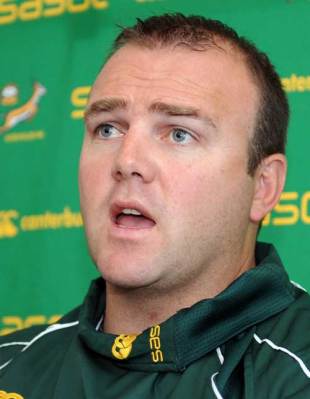|
Tri Nations
SANZAR alliance hits troubled waters
Scrum.com
April 29, 2009

SA Rugby chief Andy Marinos has expressed his worry at the current state of the SANZAR alliance
© Getty Images
Enlarge
The future of the long-standing SANZAR alliance, the governing body for the Tri-Nations and Super 14, has been cast further in to doubt after a group charged with investigating the routes available for the future of Super Rugby was halted at the request of the Australian Rugby Union. The unions of Australia, South Africa and New Zealand have been unable to find a formula for the Super 14 that is mutually acceptable for all three countries, and time is now running out before their June 30 deadline to present their case before potential broadcast partners. The three unions have been unable to thrash out a program allowing for domestic competition and the June Test window to work in harmony, with the strength and popularity of South Africa's Currie Cup competition and Australia's desire for an extended Super 14 season jarring. Andy Marinos, acting managing director of SA Rugby, maintained that South Africa was committed to the SANZAR alliance and was worried to hear that Australia and New Zealand were considering a purely Trans-Tasman competition. "We're committed to the SANZAR relationship and have no desire to walk away from it, but it is a cause for concern that Australia and New Zealand have advised SA Rugby that they will be exploring the option of establishing a purely Trans-Tasman competition," said Marinos. "That is their right but the Super Rugby format that is currently on the table now has only one stumbling block." While all parties agree that the Super 14 should be expanded, the timing of the extra fixtures has become a sticking point. South Africa would rather start the competition earlier, with the Currie Cup following, while continuing through the Test window is favoured by New Zealand and Australia. "We're all agreed on expansion and lengthening the Super Rugby season," he said. "To accommodate that Australia and New Zealand want to continue playing Super Rugby with weakened teams during the June in-bound Test window. We prefer to start earlier - in mid-February - and then suspend playing Super Rugby during the Test window. But because of declining crowds in Australasia - particularly at the start of the season - they would like to delay kick off until March. "We've suggested that South Africa starts the schedule two weeks earlier, while they start in March. But Australia and New Zealand are not prepared to compromise on that idea as they say the break would be an advantage to South Africa. For the last 14 years South African teams have been annually disadvantaged by the length of our tour so we know better than anyone about 'disadvantage', but there's simply no way that Australia or New Zealand would be disadvantaged to anything like the same extent by this structure." Australian officials are conscious that their lack of a domestic competition places them at a disadvantage compared to South Africa and New Zealand, who also have a long history of domestic competition in the NPC, now known as the Air New Zealand Cup. Their increased desire for Super 14 rugby has been met with apprehension in Sotuh Africa, who have refused to compromise the integrity of the Currie Cup. "We've got 14 provinces all playing in two senior domestic competitions and two age-group tournaments and five of them play Super Rugby on top of that - and there is absolutely no appetite to compromise further at the expense of the Currie Cup," said Marinos. "The nine New Zealand provinces who are not Super 14 franchise holders are also concerned about the impact that these plans may have on the fabric of New Zealand rugby - and they're right to be.We want to expand Super Rugby and would even like to move to a Super 18 with each nation hosting a conference of six teams. But we would be reckless if we were pushed by another territory's dynamics into destroying what has made us the rugby nation we are over the last 118 years of Currie Cup rugby. "What we're all clear about and have agreed though is to the continuation of the Tri-Nations and will plan to meet with Argentina and the IRB in May to further discuss the possible inclusion of Argentina in the competition to create a Four Nations." © Scrum.com
|
Live Sports
Communication error please reload the page.
-
Football
-
Cricket
-
Rugby
-
- Days
- Hrs
- Mins
- Secs
F1 - Abu Dhabi GP
Abu Dhabi Grand Prix December 11-131. Max Verstappen ()
2. Valtteri Bottas (Mercedes)
3. Lewis Hamilton (Mercedes)
4. Alexander Albon ()
5. Lando Norris ()
6. Carlos Sainz Jr ()
-
ESPNOtherLive >>
Golf - Houston Open
Snooker - China Open
Tennis - Miami Open

